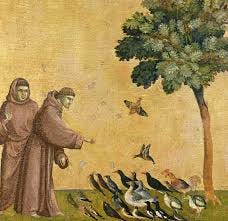Introduction
Saint Francis was born Giovanni di Pietro di Bernardone in 1181. He died in 1226. He left his early life of wealth from his family to become a mystic, poet, and an itinerant preacher. He is associated with the patronage and care of animals and the environment. He was devoted to working with people experiencing homelessness and comforting those who suffered from leprosy. He founded the religious order of Franciscans and lived a life of devotion to serving others. In 1979, Pope John Paul II proclaimed Francis as the patron saint of the environment and ecology. He is also the patron saint of Italy and is the namesake of the city of San Francisco. This essay explores the central teachings of Saint Francis and how they embodied these principles throughout his life, identifying the relevance in contemporary society. To understand Saint Francis's impact, we can look at the core values he lived by. These guiding principles, which are rooted in compassion, simplicity, and care for others and the earth, remain deeply relevant today.
Emphasis on Compassion and Love: At the heart of Saint Francis' philosophy is the profound sense of compassion for all living things. He believed that every creature, whether human or animal, deserves respect and care. He wrote “Canticle of the Creatures,” which expresses his view of creation as a family in which all elements coexist in harmony. He referred to the sun as “Brother Sun” and the moon as “Sister Moon,” highlighting the interconnectedness of all life forms. This perspective has inspired contemporary environmental movements, which focus on protecting and preserving the natural world.
Simplicity and Humility: Francis’ life exemplifies humility. After experiencing a spiritual awakening, he renounced his life of wealth and privilege to adopt a life of poverty and simplicity. He chose to rely on what the earth provided and disavow material possessions. Contemporary environmental movements advocating for sustainable lifestyles encourage these principles as they encourage us to reduce consumption and develop a closer appreciation for nature’s bounty.
Care for Creation: Saint Francis recognized the value of creation and the need for stewardship over the earth. He witnessed the degradation of nature. He thought to promote environmental consciousness long before the branch of biology, “ecology,” which studies the relationship between living organisms and their environment, was established. His approach emphasized living in harmony with the environment, advocating for engaging in behaviors that protect the earth’s resources. Today, numerous ecological movements promote conservation practices, ecosystem regeneration, and sustainable agricultural practices that align with his principles.
Social and Economic Justice: Francis also championed social justice, advocating for and serving the marginalized and disenfranchised. He denounced the greed associated with societal structures that marginalize people experiencing poverty, arguing that true wealth lies in communal well-being and solidarity. His emphasis on economic justice is relevant today, particularly in addressing issues such as inequality, poverty, and corporate exploitation. Various social movements rooted in his teachings strive for systemic change, aiming to empower marginalized communities while promoting fair trade, ethical consumerism, and equitable labor practices.
Brotherhood and Solidarity: Central to his character is the idea of brotherhood and universal kinship among all people and creatures. Francis emphasized the importance of community and the value of working together to support one another. His commitment to fraternity, particularly among the ‘outcast’ members of society, reflects an early understanding of inclusivity that resonates in our contemporary social justice movements. His legacy inspires the need to create global citizenship. Teaching each of us to act with empathy and solidarity toward others, no matter how different they are, transcending national and cultural boundaries.
The Role of Faith and Spirituality: Saint Francis’s teachings are deeply rooted in his Christian faith, emphasizing humility and repentance. He believed that an authentic spiritual life is expressed through actions, a notion foundational to contemporary beliefs in living faith through social action. His deep connection with nature also fosters a sense of spirituality that many modern movements share, recognizing the sacredness of the earth and the necessity of taking actions that nurture its well-being.
Ecological Spirituality: In his later years, Francis’s deep connection to nature evolved into what has been termed “ecological spirituality.” This concept recognizes that spirituality can foster a profound sense of responsibility toward the environment. His teachings encourage individuals and communities to engage with nature, cultivating an appreciation for biodiversity and embracing practices that safeguard the earth for future generations. Various spiritual movements today draw connections between Francis’ insights and the need for ecological justice, advocating a shift in consciousness towards sustainable practices.
Conclusions
The teachings and actions of Saint Francis of Assisi, particularly regarding compassion, simplicity, care for creation, social justice, fraternity, faith, and ecological spirituality, continue to resonate in our modern contexts. His life serves as an enduring testament to principled and purposeful living, advocating for a harmonious relationship with nature and with one another. Today, as we navigate pressing issues such as climate change, social inequality, and environmental degradation, the wisdom of Saint Francis inspires numerous movements striving for justice, equity, and sustainability. By adopting his teachings, we, as a united society, can create a more compassionate and sustainable future, honoring the interconnectedness of life. He taught us that our joy comes from serving others, that love, humility, and compassion are the key behaviors to living a meaningful and purposeful life.
Thank you, and please pass it on.



